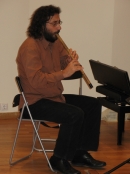Traditional and Folk Music
Greek traditional music
Greek traditional music, also known as “demotic music” as it is usually called, includes all the songs, tunes and rhythms of the regional Greece (excepting the more modern urban environments). It comprises of compositions which, in their overwhelming majority, have unknown composers, have been in existence for more than a century and their roots can be traced from the Byzantine era until ancient times.
This music does not consist of one genre, but many, usually characterised by the tone and the ethos of the region it is played in or originates from (Island music, Epirotic music, Pontic music). It is also closely related to the music of neighbouring countries. Apart from locality, traditional songs and tunes can be classified according to their content and the occasion for which they are performed (carnival, wedding, farewell songs) or by their musical, rhythmical and literary characteristics (strophic, heptasyllabic, karsilama, etc).
Instuments of Greek Traditional Music include: the lyra, the violin, the laouto, the outi, the tambouras, the boulgari, the mandolin, the kanonaki, the sandouri, the klarino, the zournas, flutes, the toubeleki, the daouli, the defi, etc.
Greek folk music
In the beginning of the 20th century urban centres with a strong Greek presence (Istanbul, Smyrna, Syros, Ioannina, Patra, Thessaloniki, Piraeus) a species of music called rebetiko developed amongst other musical genres.
The definition of the term is of uncertain etymologic origin and its usage is diverse, especially after the numerous relevant studies from Greek and foreign experts and non-experts alike, so-called “Rebetologists”, which have seen the light of publicity over the last 30 years. Nevertheless, the opinion that the root of the word is related to the Turkish counter-loan “rebet” or even the Italian “rebelo”, which means the rebel, the insubordinate, the outsider is increasingly popular. According to others, the word originates from the Greek verb “remvo”, which means one who daydreams, who wanders.
The Rebetiko song is the Greek urban song in its beginnings. It developed through the Greek music tradition of the demotic song and “kleftiko”, from the denizens of the Greek towns. The first rebetiko influences, the so-called “mourmourika” and “sevdalidika”, were recorded in Athens around the Psyrri area in 1834 and started to gain in popularity and to develop further.
During the same period the Bavarians tried to introduce in the Athenian society the cadrilia and the polka.
The folk music of the 1950s-1960s is considered a derivation of rebetiko music, which continues to currently evolve. In the 1960s the “Entekhno” music made it appearance, initially in the context of melodified poetry and “song cycles” by their main representatives, Manos Hatzidakis and Mikis Theodorakis.
The representative instruments of folk music include the bouzouki, the baglamas, and the tzouras.





